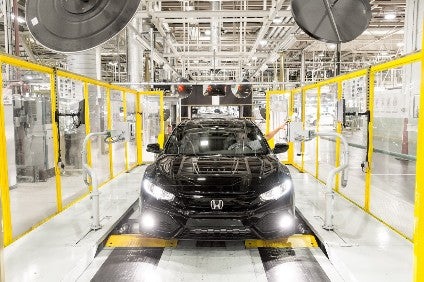
Japanese companies and investors would be forced to reassess their four decade bet on the United Kingdom if there was a disorderly exit from the European Union that shattered supply chains and cut off access to the bloc, Japanese ambassador Koji Tsuruoka told the Reuters news agency in an interview.
The diplomat’s warning echoed that of leading automotive industry representatives who have warned of adverse consequences for the region’s industry in the event of a ‘no-deal’ Brexit.

Discover B2B Marketing That Performs
Combine business intelligence and editorial excellence to reach engaged professionals across 36 leading media platforms.
The ‘four decade bet’ Tsuruoka referred to relates to the late seventies move by Japan, the world’s third-largest economy, to make the United Kingdom its favoured European destination for autos investment.
That resulted in Honda (which also established a joint manufacturing agreement for shared Honda/Rover model lines in both the UK and Japan), Nissan, and Toyota all establishing car and engine factories in various parts of the UK – encouraged by former prime minister Margaret Thatcher to use the country as a launchpad into Europe, leveraging well established EU free trade arrangements.
Reuters said many Japanese investors in the UK have expressed concern in private that a disorderly exit could turn upside down the entire business case for investing in British manufacturing.
The news agency noted Japan is one of the biggest sources of foreign direct investment in Britain which its companies have long seen as a pro-business, liberal gateway into the rest of the EU.
“If those conditions drastically change and make it impossible for companies to adapt, they will have to consider very carefully how they will go about continuing business here in the UK,” the Japanese ambassador to London, Tsuruoka, told Reuters.
“They like it here and they are happy being here,” Tsuruoka said. “The only hope that they are now wishing is that they will be allowed to continue to do good business here in the UK.”
Citing UK statistics, Reuters said Japanese companies had invested over GBP81bn in Britain, making its FDI the fifth-largest after the United States, Germany, France and the Netherlands.
More than three years of political squabbling over Brexit have left allies and investors puzzled by a country that for decades seemed a confident pillar of western economic and political stability, Reuters said, noting that [with just five weeks to go to the latest, delayed, 31 October ‘exit’ date], it was still unclear on what terms the UK would leave the EU. Options range from a last-minute exit deal or delay to an acrimonious split that would knot up the networks of trade.
The news agency also noted UK prime minister Boris Johnson had repeatedly said he wanted to strike a deal at an 17-18 October EU summit but, if the EU turns down British demands, he would lead the UK out without a deal on 31 October. Without a deal, Britain would quit the EU’s 500m-strong single market and customs union overnight, falling back on World Trade Organisation rules, which could mean many import and export tariffs. There would be no transition.
Tsuruoka told Reuters he was hoping for an orderly exit. Nearly 1,000 Japanese companies based in Britain employ more than 150,000 people.
“The UK has provided Japanese companies and investors with very important business opportunities, which they have profited from now for three or four decades,” Tsuruoka told the news agency.
“The question really is whether this will drastically changed or will there be a continuity of the sound business environments they have enjoyed,” he said. “There are not too many answers that are available today and therefore they are watching very carefully.”
Car makers, the country’s biggest exporter of goods, has been one of the most vocal opponents of a no-deal Brexit, warning that production would be hit with tariffs, border delays and new bureaucracy, ruining the viability of many plants.
Of the just over 1.5m cars produced in Britain last year, Japanese auto makers Nissan, Toyota and Honda built about half, the report said.
Honda in May (two months after Brexit was postponed from the original 31 March) said it would close its Swindon plant. It did not cite Brexit as a reason, saying instead the decision was part of its broader global strategy in response to changes to the automotive industry: “As previously communicated in February, Honda is accelerating its electrification plans, and as a result resources, capabilities and production systems for electrified vehicles will be focused in regions with a high volume of customer demand.”
“The Japanese companies that are investing are global operators and they are watching it very carefully,” Tsuruoka told Reuters.
“If none of the predictability is there, then you cannot plan, so you will have to stop and then consider when things are clear.”
Reuters noted British trade minister Liz Truss was currently on a visit to Tokyo and has called for a new post-Brexit trade agreement with Japan as soon as possible.
“I am in Tokyo today to deliver one very clear message: the UK is ready to trade,” Truss said. “The UK is an open, welcoming country and we are the perfect place to do business.”
See also: European automotive leaders warn on ‘no-deal’ Brexit






